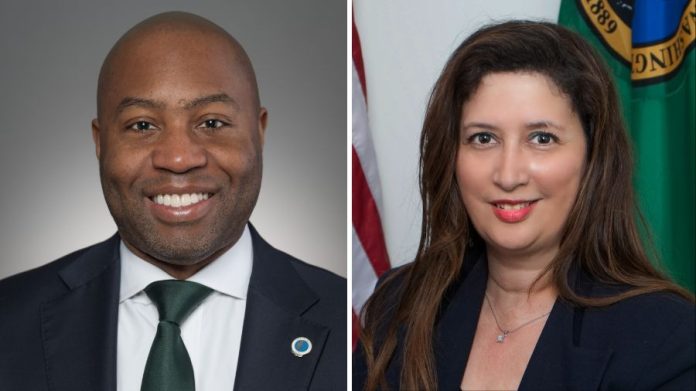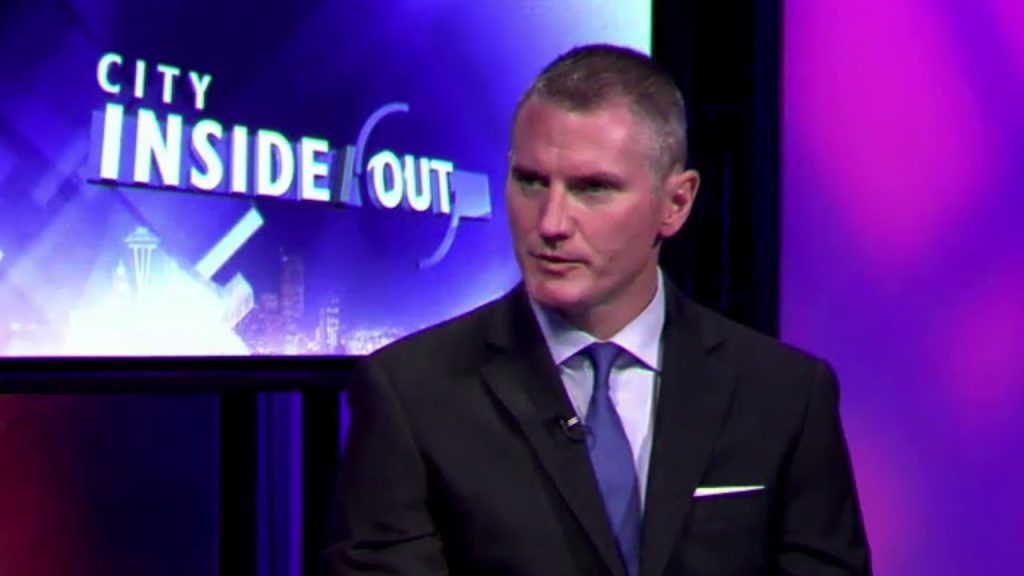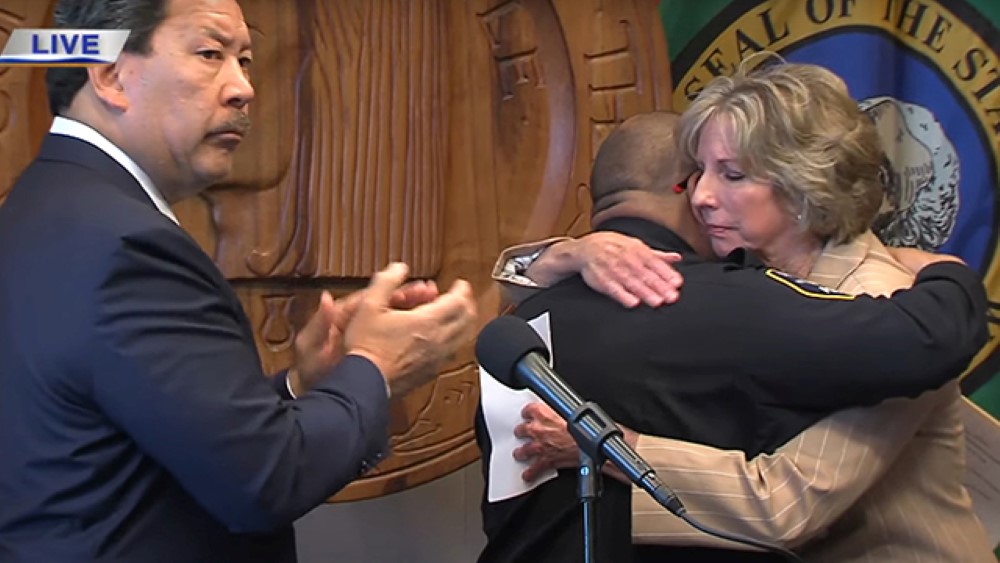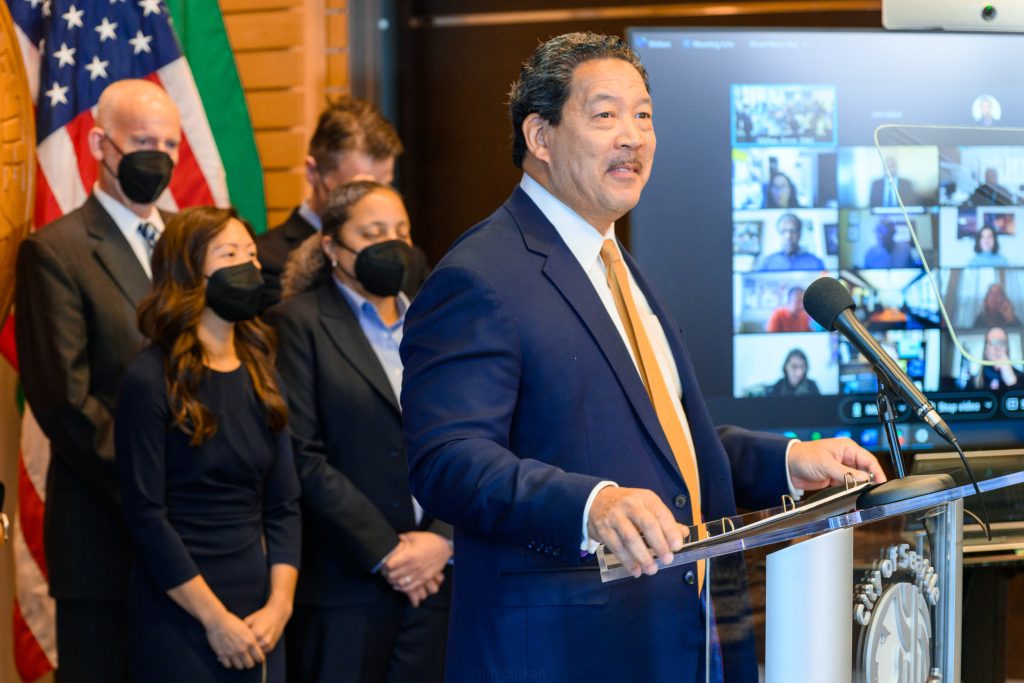
On November 22, Seattle Mayor Bruce Harrell announced that Office of Police Accountability (OPA) Director Gino Betts was resigning after two-and-a-half years of service. During his tenure, Betts has faced criticism from the Seattle Police Officers Guild and interim Seattle Police Department (SPD) Chief Sue Rahr, as well as complaints of harassment and creating a toxic work environment at the OPA. His last day will be December 13.
Filling in as interim director will be Bonnie Glenn, who currently serves as the OPA’s deputy director. Glenn has worked at the OPA since October of last year. Prior to that, she served as an administrative law judge and a lead assistant city attorney, as well as being an adjunct faculty member at Seattle University’s Criminal Justice Department.
“I look forward to serving the people of Seattle in this important role, with the highest integrity, respect, and fairness to all,” Glenn said. “I know the importance of ensuring a well-functioning accountability system in strengthening community and police relationships.”
Betts was confirmed as OPA director on September 20, 2022. His term as OPA director was set to run for four years, when he would have been eligible to be appointed for a second term.
Interim Director Glenn has yet to indicate whether she will seek the position on a permanent basis, but The Urbanist has reached out to ask.
OPA Director under fire
Betts took over from former OPA director Andrew Myerberg, who moved over to the Mayor’s Office, first as public safety director and later as chief innovation officer.
During the confirmation process, Betts stood out as a strong supporter of divorcing accountability standards from the police guild contract. He said he thought the OPA should “consist of 100% civilian investigators,” a measure that was and remains precluded by the City’s contract with the Seattle Police Officers Guild (SPOG). During a public forum for finalists for the position, Betts flagged the obstacle that the SPOG contract represented for police accountability.
“I think police [unions] have done a masterful job, not only here in Seattle but nationwide, of turning what has historically been a labor negotiation [that] would consist of salaries, benefits and vacation days, things of that nature, and making it into a legal shield against police accountability,” Bett said.
In the two and half years since he was confirmed, Betts has come under fire from SPOG. In particular, Mike Solan, the president of SPOG, criticized the OPA’s handling of the case involving SPOG’s vice president Daniel Auderer.
Auderer made international headlines last year when he accidentally recorded himself on his body cam speaking to Solan and mocking the death of Jaahnavi Kandula, a student who had been hit and killed by a SPD officer speeding in his police cruiser. Auderer laughed, said to “just write a check,” and claimed Kandula “had limited value.” Journalists got their hands on the recording in a public records request.
In the course of OPA’s investigation of this case, they called Solan for a second interview, which Solan characterized as “union discrimination.” The Seattle Times reported that Solan also said it was “unconscionable” that the OPA didn’t grant Auderer’s request for a rapid adjudication of the complaint, a process generally used for minor to moderate policy violations.

The OPA later recommended sustained findings in the Auderer case.
“The officer’s comments undermined public trust in the department, himself, and his colleagues,” Betts said in a press release. “For many, it confirmed, fairly or not, beliefs that some officers devalue and conceal disparaging views about community members.”
This summer, Chief Rahr fired Auderer, citing his professionalism violation. However, she disagreed with Betts’s finding of biased policing, writing, “Regarding your alleged violation of the Bias Free Policing Policy, I disagree with the conclusions of OPA sustaining that allegation and will take the necessary steps to overturn their finding.”
Auderer later filed a $20 million tort claim against the City.
As The Seattle Times reported, Rahr has reduced or dismissed discipline in three other OPA cases during her five-month tenure. In her letters, she expressed the wish for more cases to be handled via supervisor actions instead of through the OPA, a way of handling officer misconduct that provides less transparency.
When Rahr presented before the council’s public safety committee in July, she criticized the OPA in her remarks. “One of the challenges I’m having is the current operation of our accountability system really goes against the basic tenets of procedural justice,” Rahr told councilmembers.
“We need to have a more clear distinction between what constitutes minor misconduct and serious misconduct,” Rahr continued. “Because we have a lot of minor misconduct investigations that are going to OPA, and I have the perception that it’s clogging up the system, to be really blunt.”

Despite being billed as an unbeholden reformer, Rahr is taking up a campaign begun by her predecessor, former Chief Adrian Diaz, who told the council in March that interactions with the OPA was causing low morale in SPD officers.
“One of the things that becomes, sometimes, a morale issue is… that we have such a huge robust level of accountability that it becomes as soon as they see an OPA confidential… even though they feel like they haven’t done anything wrong, it becomes an emotional drain on them,” Diaz said.
In other cases, critics have suggested the OPA under Betts hasn’t fostered enough accountability for SPD’s top brass, pointing to Betts’ handling of several complaints against former Chief Diaz, which came to light via an anonymous whistleblower from within the OPA. The whistleblower alleged that Betts neglected the cases, creating unnecessary delays of up to 16 months.
Like Diaz, Betts has been plagued with accusations of harassment and creating a toxic work environment for his staff. Before leaving the office, former OPA investigations supervisor Kirsten Arrowood filed a complaint against Betts with HR alleging harassment and misconduct, a complaint that HR dismissed.
My NorthWest reported that the whistleblower email alleged that at least seven civilian OPA employees have filed complaints with HR about Betts’s workplace conduct, detailing several examples of staff mistreatment, and said that “the majority of OPA staff have lost confidence in Betts.”
While being criticized on several fronts, Betts hasn’t received strong support from elected officials.
Less than a year into Betts’ tenure, Senior Deputy Mayor Monisha Harrell, who was considered a champion for police accountability in the Mayor’s office, resigned her position. Mayor Bruce Harrell appointed Tim Burgess to replace her as Senior Deputy Mayor; Burgess earned a hardline reputation as a police ally as a three-term Seattle City Councilmember, and also worked for SPD as a press aide and detective in the 1970s.

Shortly thereafter, Betts lost two staunch police accountability advocates in former Councilmembers Lisa Herbold and Teresa Mosqueda who left office and were replaced with a wave of back-the-blue centrists joining the Seattle City Council at the beginning of this year. Instead, Betts found himself operating with a council that has consistently privileged officer recruitment, retention, and morale over accountability, even to the point of considering lowering hiring standards.
Dysfunction plagues Seattle’s accountability system
The upheaval at the OPA is not the only turmoil rocking Seattle’s accountability system, and more broadly, its public safety system this year.
As the federal consent decree nears its end after more than a decade of reform efforts, the three-legged stool of police accountability it created in Seattle, which consists of the Community Police Commission (CPC), the Office of the Inspector General (OIG), and the OPA, seems wobblier than ever, raising questions about its original design. From the beginning, the CPC, envisioned as being the voice of the community for police accountability, was largely sidelined and given little real authority, while the OPA was set up as a weak department with a bevy of loopholes for SPOG to exploit along with the inability to civilianize or subpoena officers as needed.
These design flaws have been raising doubts about the strength of the accountability system since its inception, which in turn presents an obstacle to recruiting and retaining talented employees and members at either organization.
PubliCola documented many of the problems occurring within the CPC over the past few years, including failed community outreach, abusive behavior by leadership and commissioners, and shutting down public comment at meetings. CPC Director Cali Ellis was on administrative leave and that over the summer, almost every member of the CPC’s staff either resigned or went on leave, PubliCola reported in late August. The CPC’s acting executive director is now Eci Ameh.
The CPC is supposed to consist of 15 commissioners, appointed in equal proportions by the Mayor, the City Council, and the CPC itself. However, it only has 10 commissioners currently listed on its website, and of those 10, two have terms that expired a year ago and three have terms that expire at the end of this year. Two of the CPC’s spots are taken by sworn SPD officers representing SPOG and the Seattle Police Management Association (SPMA).
CPC commissioners have complained that their recommendations are ignored and that the CPC is not able to have real impact. As such, the CPC has struggled to keep a full, active roster of commissioners. This in turn leads to difficulty in reaching quorum for their meetings or being able to take on appropriate projects.
The OIG appears to be the only accountability body of the three that isn’t publicly struggling. OIG Inspector General Lisa Judge has served since 2018 and was reconfirmed in her position earlier this year for a term lasting until the end of 2030. While Judge has not been immune to criticism, as she was also named in the whistleblower’s email regarding her neglect of the cases against Diaz, she appears to be navigating the political headwinds of her position more skillfully, at least thus far.

Meanwhile, SPD has operated under two chiefs this year, with a new third chief expected to be announced by the end of the year. And Amy Barden, the chief of the Community Assisted Response and Engagement (CARE) department, Seattle’s third public safety department, was only confirmed this summer.
Next steps
With Betts’s departure, Harrell will need to appoint a new OPA director. He has 90 days to initiate a new search and will select between “up to three qualified finalists identified by a search committee through a national process using merit-based criteria.”
The process to hire Betts in 2022 took most of the year, with Myerberg leaving in January and Betts being confirmed by the council later in September. The process lacked transparency, with a public forum featuring the final three director candidates being announced well ahead of time, only to be abruptly moved up two weeks with no notice.
Between indulging SPD rhetoric that accountability can harm officer morale and passing a new SPOG contract that made few meaningful strides in accountability, it doesn’t appear that police accountability is a top priority for either Mayor Harrell or the city council.
One has only to compare the City’s succinct 2025 legislative agenda to last year’s to see how far off the radar basic police accountability reforms have fallen. Last year’s agenda included support of legislation to strengthen the authority of police chiefs to discipline officers and lay off officers on the Brady list, to end qualified immunity for police officers, to prohibit collective bargaining on topics related to discipline and accountability, to prevent having to negotiate and pay extra for accountability measures such as body worn cameras, and to require arbitrators to use a standard of review defined by a preponderance of evidence.
None of these accountability items remain on 2025’s legislative agenda. The only item pertaining to accountability is the broad priority to “update police accountability arbitration rules and procedures to ensure discipline for misconduct is fair and consistent.”
But the OPA conducted a survey in the summer of 2023, which was designed to reach people disproportionately impacted by police, including men and people from Black and Indigenous communities. They found that 93% of responders thought police accountability was “very important” and 96% thought it’s important for Seattle to “have a department that holds SPD officers accountable.”
And in the 2023 Seattle public safety survey, out of a list of 76 “citywide themes” regarding public safety, lack of police accountability was ranked 15th in importance, in the highest quartile.
Given the popularity of a robust police accountability system, Harrell and Council President Sara Nelson, both up for reelection next year, will need to walk a fine line between giving SPD their full-throated support while still maintaining at least the semblance of holding the department accountable for misconduct. Whether Harrell’s pick for the next OPA director will have credibility among local police accountability advocates could be an indication of his intent to strike that balance or to cave to SPOG, continuing a pattern of focusing on the quantity of policing rather than the quality of policing as he heads into reelection mode.
Amy Sundberg is the publisher of Notes from the Emerald City, a weekly newsletter on Seattle politics and policy with a particular focus on public safety, police accountability, and the criminal legal system. She also writes science fiction, fantasy, and horror novels. She is particularly fond of Seattle’s parks, where she can often be found walking her little dog.


